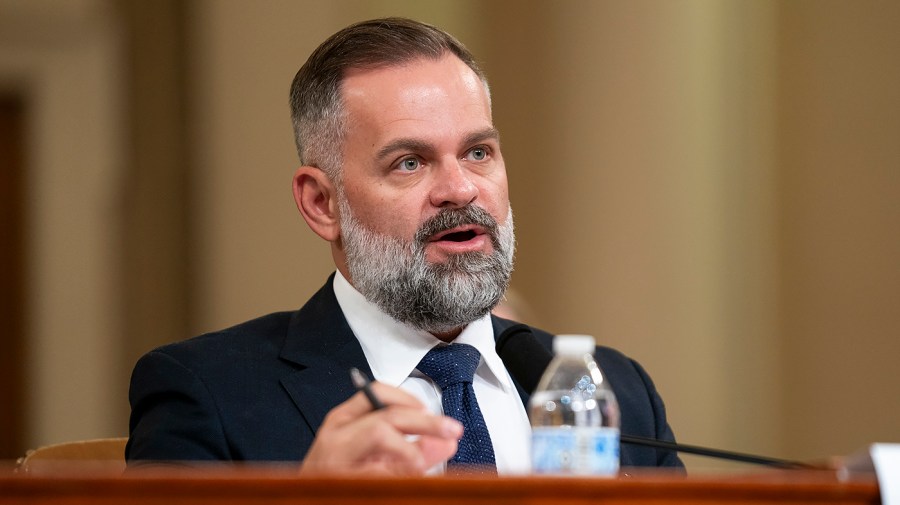
A Florida county judge on Tuesday granted a restraining order against U.S. Rep. Cory Mills (R-Fla.) after a woman accused him of harassing and threatening her after they broke up earlier this year.
Florida Republican state committee member Lindsey Langston, who was crowned Miss United States in 2024, filed an emergency motion for an injunction in August after separately telling law enforcement in July that Mills had released explicit photos and videos of her and threatened to harm other men she might date.
The judge said there was “reasonable cause to believe that Langston is in imminent danger of becoming the victim of another act of dating violence” without a restraining order. In this case, it’s cyberstalking as defined by Florida law.
Until January 1, Mills is prohibited from having any contact with Langston and is prohibited from coming within 500 feet of her residence or place of employment.
The judge found that Mr. Mills’ communications to Mr. Langston were “all designed to cause… significant emotional distress.”
Mills did not mention in court that he sent the intimate video of himself and Langston to anyone, but said he deleted the video and that his iPhone broke after receiving it. He said he intended to send a video of Langston wearing an apron and baking bread in the kitchen to other potential suitors to prove that he was also meeting her at the same time.
The court did not find that testimony to be true, but also said the statement was irrelevant because Langston did not know or interpret that the video had been deleted.
The decision came after two days of in-person hearings last month, during which Langston broke down in tears on stage, according to media reports.
The 14-page written decision details the fractious and tumultuous relationship between Langston, Mills, his wife, and another girlfriend of Mills’s who was dating at the same time as Langston, referred to in the judgment as “GF2.”
The two started dating in November 2021, when Langston was 22 years old and Mills was 41 years old, and had been living separately from his wife. Langston moved to Mills’ home in Florida. She had previously told police she believed he was divorced.
Langston suspected that Mills was not being sincere when she saw a photo of another woman at his Washington, D.C., mansion. Mills told Langston that the woman was “infatuated with him” and moved into his apartment, and on one occasion forced her way into the apartment. Actually, that woman was his other girlfriend.
In February, Langston saw a news report that police were investigating an altercation between Mills and another woman at her Washington, D.C., home. Mills and the alleged victim later denied that a physical altercation occurred. Police sent a report to the U.S. Attorney’s Office, but Mills was not charged.
Langston ended the relationship in late February or early March and moved out of Mills’ apartment, but Mills told the court that after initially reconciling for a month and a half, she was “not sure what was going on” in the relationship in May and June, and that she was in contact with Langston “to determine if the parties were reconciling or ‘dissolving’ the relationship.”
Circuit Judge James M. Swisher Jr. of Columbia County, Florida, wrote that Mills’ explanation was “difficult to understand and for the most part incomprehensible,” noting that “according to defendant’s own testimony, GF2 lived with and resided with defendant.”
“Nevertheless, Defendant initiated and continued to carry out a series of actions in which he directly communicated with Appellant using electronic communications that had no legitimate purpose,” Swisher wrote, and “intensified such communications during May and June 2025 while residing in GF2, causing substantial emotional distress to Appellant.”
The May 7 message read, “Do you want to date or be with someone else? Be my guest. But they need to know in advance that I won’t care this week, this month, or 10 years if we pass each other. They better know it’s going to happen every time.”
A May 15 message read: “I might want to tell all the guys I’m dating when I meet them someday. Buckle up your cowboy straps.”
“I can also send him some of your videos.[.] Oh, I still have it,” Mills wrote on May 15th.
“I hope you keep your crown until the end,” he wrote on June 12.
Langston asked Mills to leave her alone on 11 separate occasions between May and June.
Mills told the court that some of the communications were “for the purpose of ‘unraveling’ the relationship,” but the court said Mills “could not provide a logical or reasonable explanation” for how he did so.
Although Mills argued that the delay between her last contact with Langston and her filing the report with law enforcement showed a “lack of distress,” the judge agreed that the delay was merely “awareness” and that she had sought assistance from law enforcement prior to the date of the first report.
After Langston filed the restraining order on Aug. 5, Mills used his second girlfriend’s phone to directly call and text Langston and his family, inducing the second girlfriend and one of his government employees to contact Langston, the judge wrote.
The Hill has reached out to Mills’ office for comment. Mr. Langston could not be reached for comment by his attorney.

